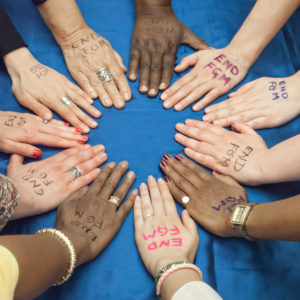Sugar-coating Female Genital Mutilation in United Nations documents in English and Arabic
A Diachronic Study of Lexical Variation
By Yasmin Raafat
This Dissertation is registered and submitted to the Faculty of Humanities (Department of Translation and Interpreting), University of the Witwatersrand, in fulfilment of the requirements for the degree of Master of Interpreting and translation.
Supervisor: Professor Judith Inggs
Johannesburg, 2017
Abstract (extract from introduction)
My struggle against FGM started around the age when most girls have already lost the fight. When I was seven, we were visiting our extended family when my cousin, who was ten, announced that I was not clean as I hadn’t yet been “purified”. My cousin was “purified” when she was seven, such is the norm, and by her logic I was therefore pronounced “unclean”. It was a surprise to me that I was not clean. I had showered and had not yet had any opportunity to soil my clothes. Sensing my confusion, my cousin explained that I needed to convince my parents to take me to the local “healer” or the doctor and to cut a part of my private area. Not wanting to miss an opportunity to advance my “purity” and probably more to fit in with my peer group, I confronted my father about this apparently galling oversight on his part. My father refused my request and told me not to be influenced by others. When I pressed him further he declined to elaborate, clearly uncomfortable with the subject matter. Purity. FGM. Taboo.
Ten years later, I started my own journey as an activist and surrounded myself with activists of many various political and social persuasions. There was always one topic that kept coming up in these myriad of beliefs, as topics with more notoriety often do: FGM. At the time, I was living with four other young women and not one of us had undergone FGM. Yet somehow, it still managed to capture us all in some way. A first cousin here, an aunty there, a grandmother’s opinion. We spoke of FGM as a barbaric brutal practice. During one such conversation, my mother who happened to be present announced (to my shame) that she thinks that every girl should be “purified”. She defended her claim saying she believed the girl will be “more promiscuous and a burden on her husband to satisfy her needs”. I was shocked.
I have learnt through my readings that FGM has four to five types depending on which parts are cut from the genitals. Girls who go through FGM have to be tied up for two weeks as a post operation procedure. When the girls enter adulthood only their husbands are allowed to cut their mutilated genitals apart to prove that they are “pure” and that they have not been touched by any other man.
FGM is practised mostly in North Africa but also in western countries as migrant groups immigrate to other countries. Fast-forward 10 years later and various governments around the world, including the Egyptian government, have banned the practice adding criminal prosecution to anyone performing FGM, both doctors and healers. Egypt, which still has some of the highest rates of FGM in the world, has yet to convict anyone.
Still, the government banning FGM did at least do something. It helped to bring FGM out of the confines of closeted intellectual debates and into the public domain. The Egyptian public started to question FGM. Some argued that there is Hadith (a collection of teachings) by the prophet Muhammed that mentions purification is a Sunna (Muslim Law based on his words or acts) for girls, while others argue that they want to “protect their daughters” (from what?). This situation made me realise the power of the government in raising awareness and changing harmful traditional practices such as FGM.
I started reading more about FGM in Arabic and English and noticed that books use different terms in English and Arabic. The terms are never consistent and the literature is confusing. Further research on the UN campaigns and the terms used in English were always different to Arabic. There are even cases where the UN uses ‘‘mutilation’’ in English and ‘‘purification’’ in Arabic. There are others terms too, “circumcision”, “excision”, “cutting”, “damaging”. Every term has its own political, religious and social connotation. There is a need for this to be explored.
I have translated and interpreted for various organisations such as the United Nations, UNICEF, Pan African Parliament, universities and ministries across Africa. However, I am just one of the many new voices who are speaking out against FGM.
Click here to access the full text of Yasmin Raafat Dissertation on FGM.
See also https://www.28toomany.org/thematic/terminology-and-fgm/
